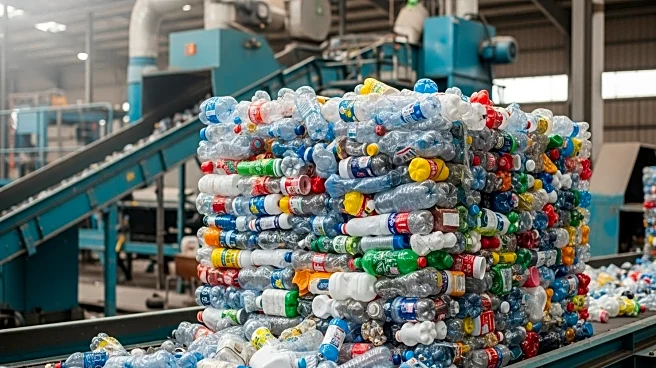What's Happening?
The UK government is facing criticism for failing to close a loophole that allows the export of 600,000 tonnes of plastic waste annually, undermining the potential for a domestic recycling industry worth £2 billion. Over the past two years, 21 plastic recycling factories have shut down due to increased exports and the influx of cheap plastic from Asia. Critics argue that exporting waste to countries like Indonesia, which struggles with plastic pollution, is unethical and irresponsible. The closure of facilities such as Biffa's Sunderland factory and Viridor's plants highlights the challenges faced by the industry. Experts advocate for keeping waste within the UK to create jobs and reduce environmental impact, but policymakers have yet to make necessary changes.
Why It's Important?
The export of plastic waste from the UK has significant implications for both the environment and the economy. By sending waste abroad, the UK misses out on the opportunity to develop a robust recycling industry that could create thousands of jobs and contribute to economic growth. Additionally, exporting waste to countries with inadequate processing capabilities increases the risk of environmental pollution and endangers the lives of waste workers. The situation calls for urgent policy changes to incentivize domestic recycling and reduce reliance on virgin plastic, which would also align with global sustainability goals and improve public confidence in recycling practices.
What's Next?
Industry leaders are calling for the UK government to close the loophole that makes exporting plastic waste cheaper than processing it domestically. There is a push for more ambitious recycling targets and the development of new facilities to handle waste within the country. The introduction of a plastic packaging tax is seen as a positive step, but experts suggest increasing the requirement for recycled content in products to further drive demand for domestic recycling. The government has pledged to invest in new sorting and processing facilities, but the effectiveness of these measures will depend on timely implementation and support from policymakers.
Beyond the Headlines
The ethical implications of exporting plastic waste are profound, as it raises questions about the responsibility of developed nations in managing their waste. The deaths of waste workers in countries like Turkey highlight the human cost of inadequate waste management practices. There is a growing awareness of the need for a level playing field in the recycling industry, where environmental and social considerations are prioritized. The situation underscores the importance of viewing waste as critical infrastructure and the potential for recycling to contribute to a circular economy.








